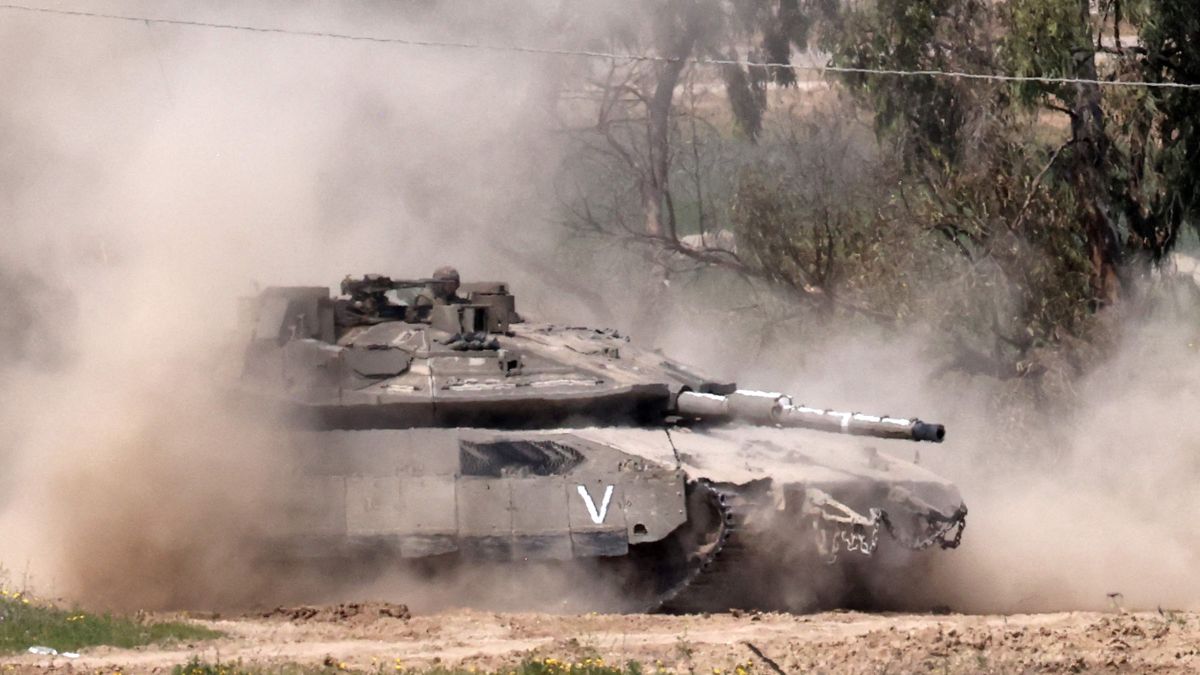UK, France and Canada warn Israel of sanctions over Gaza war and West Bank settlements
 An Israeli army Merkava main battle tank moves at a position in southern Israel along the border fence with the northern Gaza Strip on March 18, 2025 | AFP
An Israeli army Merkava main battle tank moves at a position in southern Israel along the border fence with the northern Gaza Strip on March 18, 2025 | AFP
In a coordinated move, the United Kingdom, France and Canada issued a joint statement on May 19, condemning Israel’s renewed military offensive in Gaza and its continued expansion of settlements in the West Bank. The three Western allies warned that unless Israel halts its military operations and lifts restrictions on humanitarian aid, they would consider imposing targeted sanctions and take further “concrete steps” in response.
The statement marks one of the strongest rebukes of Israel’s actions from key Western powers in recent months. While reaffirming Israel’s right to defend itself against terrorism, the leaders criticised the scale of the current operation, calling it “disproportionate” and “egregious”. They urged Prime Minister Benjamin Netanyahu’s government to cease the offensive and to facilitate the entry of much-needed humanitarian aid into the besieged enclave, stating that failure to do so “risks breaching international humanitarian law”.
The criticism comes amid a devastating new Israeli ground operation in both northern and southern Gaza, launched over the weekend under the name “Gideon’s Chariots”. The offensive followed a series of brutal airstrikes, which according to Palestinian health authorities, have led to widespread civilian casualties and destruction, including the bombing of a warehouse storing UK-donated medical supplies.
Despite a limited resumption of aid on May 18—just five trucks entered Gaza for the first time in over two months—the leaders of the UK, France and Canada deemed the measure “wholly inadequate”. They emphasised that the scale of suffering in Gaza, coupled with the prolonged blockade, has created a humanitarian catastrophe that threatens to spiral into mass famine.
The joint statement also condemned Israel’s ongoing settlement activity in the occupied West Bank. The three countries warned that further expansion would “undermine the viability of a future Palestinian state” and reiterated their commitment to a two-state solution. They stressed their opposition to any unilateral actions that jeopardise peace, warning that continued settlement construction could also trigger targeted sanctions.
The Western leaders praised mediation efforts by the United States, Qatar, and Egypt to negotiate a ceasefire and secure the release of hostages held by Hamas. They asserted that a political resolution to the conflict—one that ends Hamas's control over Gaza and lays the groundwork for Palestinian statehood—is the only sustainable path forward. This vision, they said, aligns with the goals of the upcoming international peace conference in New York, scheduled for June 18, which would be co-chaired by Saudi Arabia and France.
Central to that peace effort is the so-called “Arab plan”, which proposes the establishment of a six-month transitional government of technocrats in Gaza, followed by the restoration of the Palestinian Authority (PA) control over the Strip. It permits Gazans to stay back during reconstruction, which would be overseen by international peacekeeping forces under the mandate of the UN Security Council. Meanwhile, Egypt and Jordan are expected to train the Palestinian police.
Israel is opposed to this proposal as it skirts a direct confrontation with Hamas. The plan envisages disarmament and reintegration of armed groups through a broader political process. Israel is unlikely to accept any plan that retains Hamas’s influence in Gaza.
As pressure from the international community grows, Netanyahu issued a defiant statement, accusing the UK, France and Canada of rewarding terrorism. He argued that calls to end Israel’s military campaign and support for Palestinian statehood amounted to “offering a huge prize for the genocidal attack on Israel on October 7” and would only embolden future violence.
Netanyahu reiterated that the war would only end if all captives were released, Hamas disarmed, its leaders exiled and Gaza demilitarised. “No nation can be expected to accept anything less,” he said.
He also echoed support for President Donald Trump’s proposed solution, which had controversially included the potential relocation of Gaza’s population. That plan has been widely rejected internationally.
The Netanyahu government has finally allowed aid into Gaza under pressure from Washington, though the blockade remains largely intact. Israeli officials maintain that any loosening of restrictions risks enabling Hamas, which they accuse of diverting aid and prolonging the conflict.
Middle East